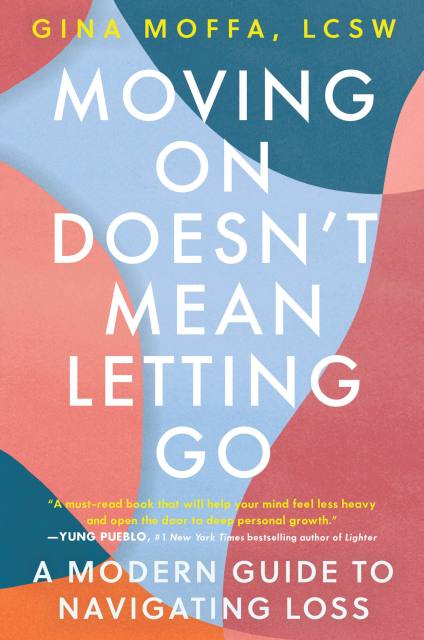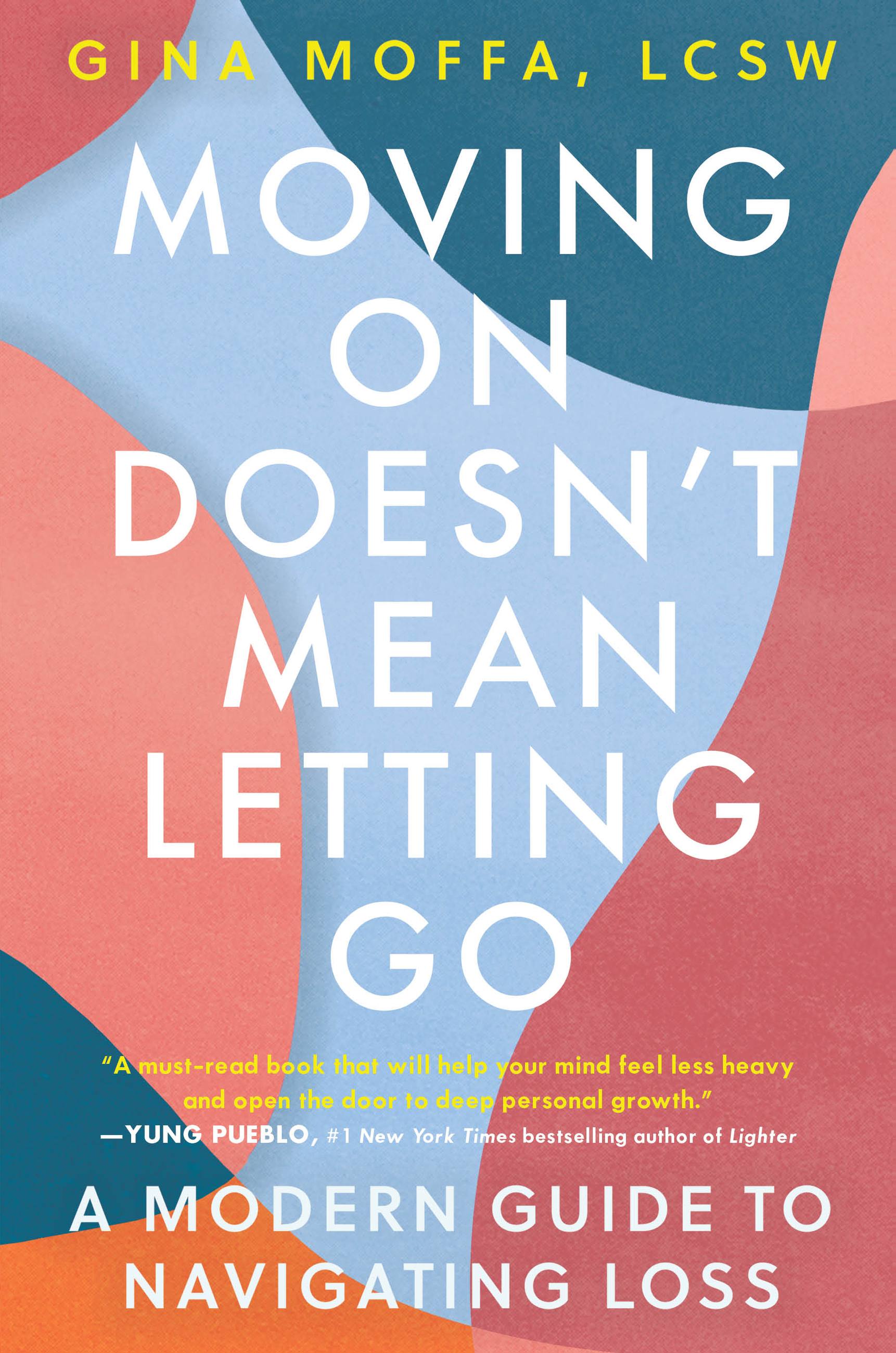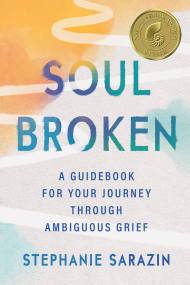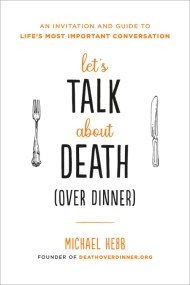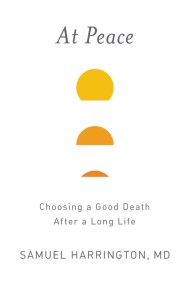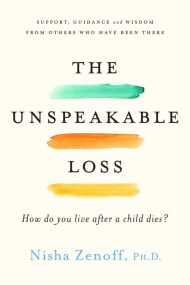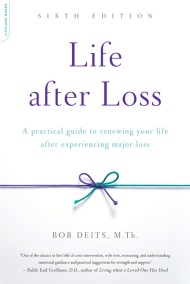By clicking “Accept,” you agree to the use of cookies and similar technologies on your device as set forth in our Cookie Policy and our Privacy Policy. Please note that certain cookies are essential for this website to function properly and do not require user consent to be deployed.
Moving On Doesn’t Mean Letting Go
A Modern Guide to Navigating Loss
Contributors
Formats and Prices
- On Sale
- Aug 22, 2023
- Page Count
- 272 pages
- Publisher
- Balance
- ISBN-13
- 9781538740682
Price
$14.99Price
$19.99 CADFormat
Format:
- ebook $14.99 $19.99 CAD
- Audiobook Download (Unabridged) $27.99
- Trade Paperback $19.99 $25.99 CAD
This item is a preorder. Your payment method will be charged immediately, and the product is expected to ship on or around August 22, 2023. This date is subject to change due to shipping delays beyond our control.
Buy from Other Retailers:
After nearly two decades of clinical experience and her own journey after losing her mother to cancer, Gina Moffa, LCSW offers knows all too well how disorienting, painful, and lonely grief can be. In Moving on Doesn’t Mean Letting Go, she offers a heartfelt, practical map through loss—one that can shift the pain of your grief even when things feel unpredictable and overwhelming. With her help you’ll learn to:
- Navigate the initial shock of the “griefall
- Recognize your unique grief rhythm
- Get in touch with your needs, feelings, and boundaries
- Manage social media and interactions with the outside world
- Connect mind and body through somatic exercises and self-reflections
“A must read. Help your mind feel less heavy and open the door to deep personal growth." —Yung Pueblo, #1 New York Times bestselling author of Lighter and Clarity & Connection
-
“A must-read book that will help your mind feel less heavy and open the door to deep personal growth."Yung Pueblo, #1 New York Times bestselling author of Lighter and Clarity & Connection
-
"This book is a lifeline to the exhausted treading water in an ocean of loss. Much like its author it is smart, kind, honest and without judgement. Anyone living with loss will find expert guidance and hope here."Steve Leder, New York Times bestselling author of For You When I am Gone, and The Beauty of What Remains
-
"A smart, modern and heartfelt guide to the painful and often confusing process of grief. Gina Moffa so beautifully shows us the roads to moving forward and turning our helplessness into agency."Galit Atlas, PhD, author of Emotional Inheritance
-
“Reading this book, I felt like Gina Moffa was right there with me in the room, gently helping me to understand grief. Both her knowledge and wisdom about the physical impact of grief and the relationship between grief and trauma make this book incredibly unique.”Mary-Frances O’Connor, PhD, author of The Grieving Brain
-
"Moving On Doesn't Mean Letting Go is a balm for the soul. With wisdom, empathy, and practical advice, Gina helps us to navigate the complex experiences that arise in the aftermath of loss to find healing in the midst of our sorrow."Kris Carr, New York Times bestselling author and wellness advocate
-
"Gina Moffa helps us gaze through the kaleidoscope of loss and hurt and make sense of what we’re seeing. Honest and gentle, knowledgeable and experienced, raw and pure, Moving On Doesn’t Mean Letting Go is about loss, but it is equally about how to live."Eveline Helmink, author of The Handbook for Bad Days
-
"We are all grieving something, and Gina Moffa's writing offers the comfort of a best friend and the support of a trusted therapist as we navigate our losses—big and small. This book is a gift for anybody who knows that life will never be the same, but hopes that it will always be worth living."Ruby Warrington, author of Sober Curious and Women Without Kids
-
"Extraordinary. Gina Moffa expertly breaks down what it actually means to hold self-compassion as we grieve, turning the abstract and often-dismissed concept of self-care into clear and practical patterns of behavior and thought that will allow mourners to feel safe and in touch with their ever-changing emotional needs. Reading her book is like having a wise friend by your side, whispering guidance and encouragement to us in the darkest of times."Colin Campbell, writer, director for theatre and film, author of Finding the Words
-
“Gina Moffa is the therapist we all need: the wise practitioner who tells you that you’re not alone in your anxiety or fear, and that there’s hope for you yet, because she’s been there too, and knows. Moving On Doesn’t Mean Letting Go is for anyone who has been touched by loss—and by that, I mean everyone.”Laurel Braitman, New York Times bestselling author of Animal Madness and What Looks Like Bravery
-
“If you don’t have a therapist on speed dial—or even if you do—this book is un-missable. Moffa shares important information on the mind-body connection as it relates to the grief experience, helping us understand how important it is to listen to what our bodies are trying to tell us.”Jenny Lisk, author of Future Widow and host of the Widowed Parent Podcast
-
"Every few years there is a book that makes me stop, pause, and breathe deeper into my body. I feel more equipped as a parent, brother, son, and partner to support those around me in their grief, and I feel ten times more confident about my capacity to hold and make space for grief myself. When I experience grief and pain in my life, I will turn to Gina's book repeatedly."Sylvester McNutt III, bestselling author of Care Package: A Path To Deep Healing
-
"Infused with clinical and personal insight and wisdom, Gina offers us a tender invitation to enter the portal of grief with compassion and self-awareness. Moving On Doesn't Mean Letting Go gives a sense of being seen and cared for every step of the way."Jessica Baum, LMHC, author of Anxiously Attached
-
"Moving On Doesn’t Mean Letting Go is the book we need to know that we don't have to navigate through grief alone."Tiffany A. Yu, Founder and CEO of Diversability, disability right's activist
-
“With the keen clinical insights of a veteran trauma therapist and the embodied wisdom of a grieving daughter, Gina Moffa offers us a book that feels like a hand reaching out in the dark. This book is a gift to all grievers and those who are hoping to become better supporters.”Meghan Riordan Jarvis, MA, LCSW, clinical psychotherapist, host of the "Grief is My Side Hustle" podcast
-
"Moving On Doesn't Mean Letting Go provides education, check-ins, and tools wrapped in both empathy and expertise. Anyone who has ever experienced any sort of loss, from the loss of a friendship, or breakup, to the loss of a loved one, will find this book a lifeline along their journey."Micheline Maalouf, LMHC, psychotherapist, host of the Mind.Fully.Healing podcast, and mental health educator
-
“This book is a big fat hug for anyone navigating the waves of grief.”Meaghan B. Murphy, author of Your Fully Charged Life and Editor in Chief of Woman’s Day
-
"Navigating the aftermath of loss can feel like an impossible journey, but equipped with the compassionate tools Moffa offers in this book, you needn’t be afraid of moving forward. This is a book I will continue to recommend to grievers and the people who love them."Rebekah Borucki, author of You Have Four Minutes to Change Your Life
-
"Moving On Doesn't Mean Letting Go gets to the heart of the grief experience for our modern day. I can't recommend this book enough to anyone who needs guidance, support, care, and understanding on this painful journey."Karen Chinca, LICSW-CEDS-2, Diplomate, Academy of Cognitive Therapy
-
“Moffa's book is a balm for anyone who's ever fumbled through the darkness of grief or felt they were somehow doing it wrong.”Salon
Newsletter Signup
By clicking ‘Sign Up,’ I acknowledge that I have read and agree to Hachette Book Group’s Privacy Policy and Terms of Use
